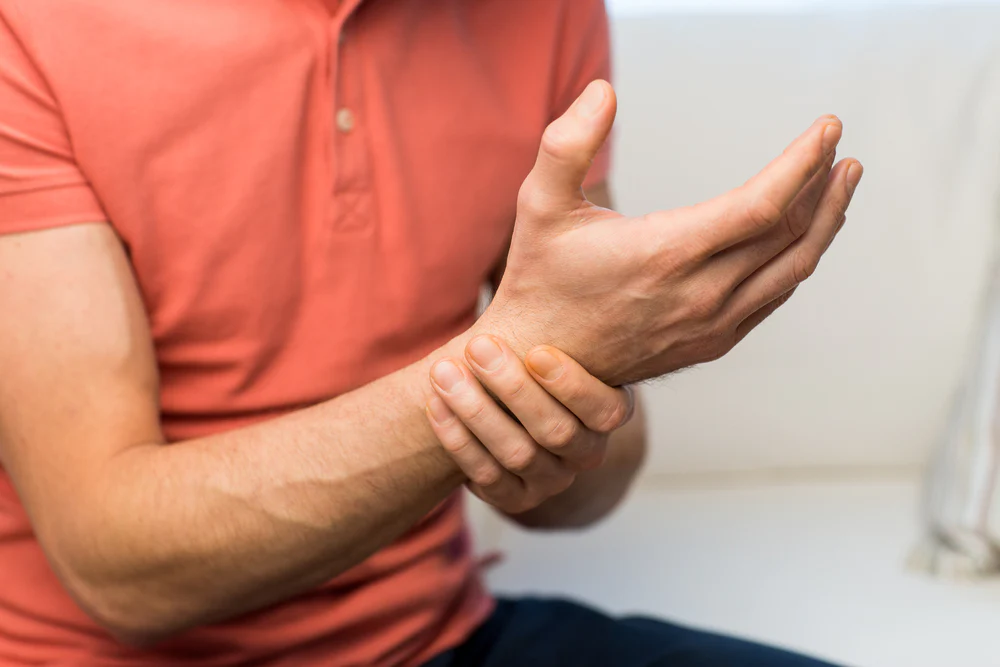Sleep Disorders and Conditions
Arm Falling Asleep
The most common cause of paresthesia is the temporary interruption of blood flow to a nerve, resulting in a "pins and needles" sensation that goes away quickly when you move the affected body part. However, chronic or recurring paresthesia can be a symptom of an underlying health issue. In this blog, we'll explore the possible causes of paresthesia, when to seek medical attention, and how it can be treated.
Have you ever woken up in the middle of the night to find your arm or another body part tingling or feeling numb? This pins and needles sensation, known as paresthesia, is a common occurrence that most people have experienced at some point in their lives. While it's usually harmless and goes away quickly, there are times when the sensation persists or is accompanied by other symptoms. In those cases, it's important to consult your doctor, as paresthesia can be a sign of an underlying medical condition. In this article, we'll explore the possible causes of paresthesia, when to seek medical attention, and how it can be treated.
What Causes Paresthesia?
As mentioned earlier, the most common cause of paresthesia is the temporary interruption of blood flow to a nerve. This can occur when you've been sitting or sleeping in an awkward position, resulting in a "pins and needles" sensation that quickly goes away when you move the affected body part. However, chronic or recurring paresthesia can be a symptom of an underlying health issue. Here are some of the most common causes:
Vitamin B deficiency: Not getting enough vitamin B in your diet can lead to paresthesia, especially in older adults, vegans, heavy drinkers, and people with pernicious anemia.
Fluid retention: Swelling caused by fluid retention can put pressure on nerves and cause tingling sensations in the affected area.
Carpal tunnel syndrome: This condition occurs when the median nerve in your wrist is compressed or pinched, often due to repetitive motions like typing or using machinery.
Peripheral neuropathy: People with diabetes are at risk for this condition, which is caused by nerve damage resulting from high blood sugar levels.
Central nervous system conditions: Multiple sclerosis and stroke can cause paresthesia, as can tumors or growths located in the brain or spine.
When to Seek Medical Attention
In most cases, paresthesia is nothing to worry about and will go away on its own. However, there are times when you should see a doctor. If you experience paresthesia frequently, for long periods of time, or if it's accompanied by pain, muscle weakness, or other symptoms, it's important to seek medical attention. Urgent medical attention is needed if paresthesia happens along with vision problems or loss, speech difficulties, extreme dizziness, coordination difficulties, or intense pain.
How is Paresthesia Treated?
If your paresthesia is infrequent, repositioning yourself to relieve pressure on the nerve or using OTC pain medication or a cold compress can be enough to relieve the symptoms. However, if you experience paresthesia frequently or for prolonged periods of time, you should see a doctor. Treatment will depend on the underlying cause of your symptoms. For example, if you're diagnosed with carpal tunnel syndrome, your doctor may recommend wrist support wraps or exercises to soothe the nerve. In severe cases, cortisone shots or surgery may be required.
The Bottom Line
Paresthesia is a common and usually harmless sensation that most people experience at some point in their lives. In most cases, it goes away quickly and doesn't require medical attention. However, if it's persistent, accompanied by pain or other symptoms, or happens frequently, it's important to see a doctor. Knowing the possible causes of paresthesia and when to seek medical attention can help you address the issue and get the treatment you need.
Sleep Disorders and Conditions
Sleepless in Psychiatry: Unraveling the Role of Sleep in Neuropsychiatric Illnesses
Sleep Disorders and Conditions
When Sleep Disorders Clock In: Insomnia’s Impact on Productivity of Young Adults
Sleep Disorders and Conditions
Why Does My Body Twitch When I Sleep
Sleep Disorders and Conditions
Hypnic Jerk: Why Do I Twitch in My Sleep?
Sleep Disorders and Conditions
When your Arm Falls Asleep: Causes and Treatments
Sleep Disorders and Conditions







